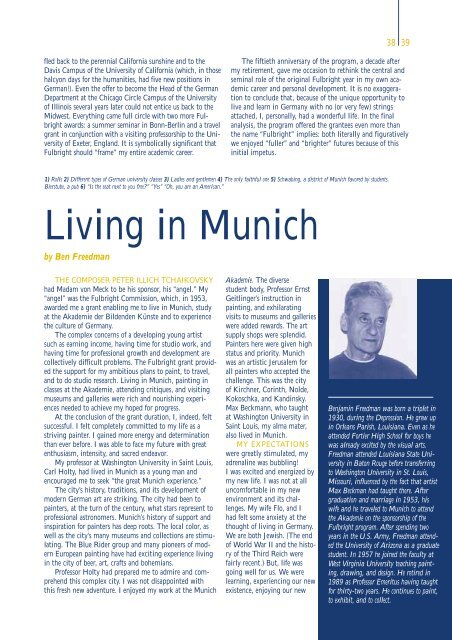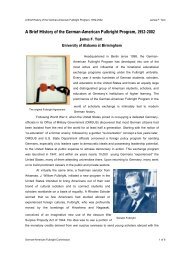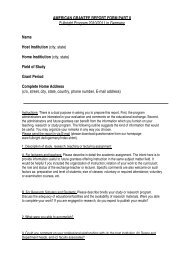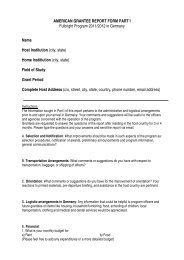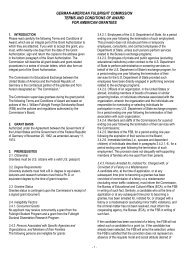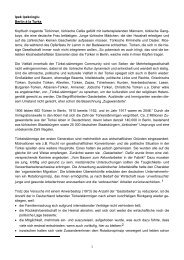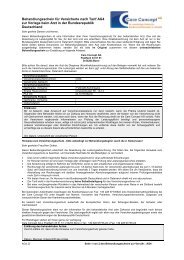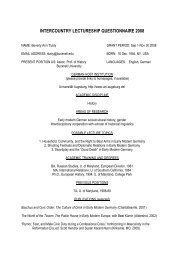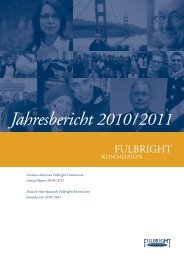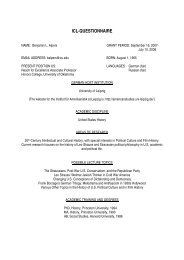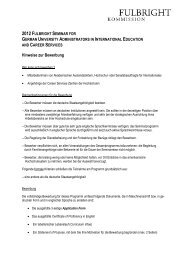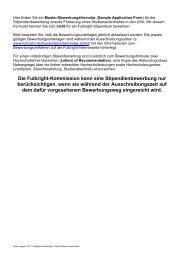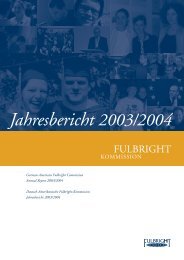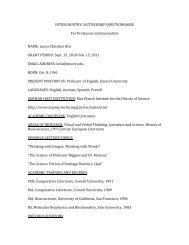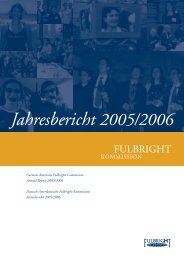The First Class of Fulbrighters - Fulbright-Kommission
The First Class of Fulbrighters - Fulbright-Kommission
The First Class of Fulbrighters - Fulbright-Kommission
Create successful ePaper yourself
Turn your PDF publications into a flip-book with our unique Google optimized e-Paper software.
fled back to the perennial California sunshine and to the<br />
Davis Campus <strong>of</strong> the University <strong>of</strong> California (which, in those<br />
halcyon days for the humanities, had five new positions in<br />
German!). Even the <strong>of</strong>fer to become the Head <strong>of</strong> the German<br />
Department at the Chicago Circle Campus <strong>of</strong> the University<br />
<strong>of</strong> Illinois several years later could not entice us back to the<br />
Midwest. Everything came full circle with two more <strong>Fulbright</strong><br />
awards: a summer seminar in Bonn-Berlin and a travel<br />
grant in conjunction with a visiting pr<strong>of</strong>essorship to the University<br />
<strong>of</strong> Exeter, England. It is symbolically significant that<br />
<strong>Fulbright</strong> should “frame” my entire academic career.<br />
38 39<br />
<strong>The</strong> fiftieth anniversary <strong>of</strong> the program, a decade after<br />
my retirement, gave me occasion to rethink the central and<br />
seminal role <strong>of</strong> the original <strong>Fulbright</strong> year in my own academic<br />
career and personal development. It is no exaggeration<br />
to conclude that, because <strong>of</strong> the unique opportunity to<br />
live and learn in Germany with no (or very few) strings<br />
attached, I, personally, had a wonderful life. In the final<br />
analysis, the program <strong>of</strong>fered the grantees even more than<br />
the name “<strong>Fulbright</strong>” implies: both literally and figuratively<br />
we enjoyed “fuller” and “brighter” futures because <strong>of</strong> this<br />
initial impetus.<br />
1) Rolls 2) Different types <strong>of</strong> German university classes 3) Ladies and gentlemen 4) <strong>The</strong> only faithful one 5) Schwabing, a district <strong>of</strong> Munich favored by students.<br />
Bierstube, a pub 6) “Is the seat next to you free?” “Yes” “Oh, you are an American.”<br />
Living in Munich<br />
by Ben Freedman<br />
THE COMPOSER PETER ILLICH TCHAIKOVSKY<br />
had Madam von Meck to be his sponsor, his “angel.” My<br />
“angel” was the <strong>Fulbright</strong> Commission, which, in 1953,<br />
awarded me a grant enabling me to live in Munich, study<br />
at the Akademie der Bildenden Künste and to experience<br />
the culture <strong>of</strong> Germany.<br />
<strong>The</strong> complex concerns <strong>of</strong> a developing young artist<br />
such as earning income, having time for studio work, and<br />
having time for pr<strong>of</strong>essional growth and development are<br />
collectively difficult problems. <strong>The</strong> <strong>Fulbright</strong> grant provided<br />
the support for my ambitious plans to paint, to travel,<br />
and to do studio research. Living in Munich, painting in<br />
classes at the Akademie, attending critiques, and visiting<br />
museums and galleries were rich and nourishing experiences<br />
needed to achieve my hoped for progress.<br />
At the conclusion <strong>of</strong> the grant duration, I, indeed, felt<br />
successful. I felt completely committed to my life as a<br />
striving painter. I gained more energy and determination<br />
than ever before. I was able to face my future with great<br />
enthusiasm, intensity, and sacred endeavor.<br />
My pr<strong>of</strong>essor at Washington University in Saint Louis,<br />
Carl Holty, had lived in Munich as a young man and<br />
encouraged me to seek “the great Munich experience.”<br />
<strong>The</strong> city’s history, traditions, and its development <strong>of</strong><br />
modern German art are striking. <strong>The</strong> city had been to<br />
painters, at the turn <strong>of</strong> the century, what stars represent to<br />
pr<strong>of</strong>essional astronomers. Munich’s history <strong>of</strong> support and<br />
inspiration for painters has deep roots. <strong>The</strong> local color, as<br />
well as the city’s many museums and collections are stimulating.<br />
<strong>The</strong> Blue Rider group and many pioneers <strong>of</strong> modern<br />
European painting have had exciting experience living<br />
in the city <strong>of</strong> beer, art, crafts and bohemians.<br />
Pr<strong>of</strong>essor Holty had prepared me to admire and comprehend<br />
this complex city. I was not disappointed with<br />
this fresh new adventure. I enjoyed my work at the Munich<br />
Akademie. <strong>The</strong> diverse<br />
student body, Pr<strong>of</strong>essor Ernst<br />
Geitlinger’s instruction in<br />
painting, and exhilarating<br />
visits to museums and galleries<br />
were added rewards. <strong>The</strong> art<br />
supply shops were splendid.<br />
Painters here were given high<br />
status and priority. Munich<br />
was an artistic Jerusalem for<br />
all painters who accepted the<br />
challenge. This was the city<br />
<strong>of</strong> Kirchner, Corinth, Nolde,<br />
Kokoschka, and Kandinsky.<br />
Max Beckmann, who taught<br />
at Washington University in<br />
Saint Louis, my alma mater,<br />
also lived in Munich.<br />
MY EXPECTATIONS<br />
were greatly stimulated, my<br />
adrenaline was bubbling!<br />
I was excited and energized by<br />
my new life. I was not at all<br />
uncomfortable in my new<br />
environment and its challenges.<br />
My wife Flo, and I<br />
had felt some anxiety at the<br />
thought <strong>of</strong> living in Germany.<br />
We are both Jewish. (<strong>The</strong> end<br />
<strong>of</strong> World War II and the history<br />
<strong>of</strong> the Third Reich were<br />
fairly recent.) But, life was<br />
going well for us. We were<br />
learning, experiencing our new<br />
existence, enjoying our new<br />
Benjamin Freedman was born a triplet in<br />
1930, during the Depression. He grew up<br />
in Orleans Parish, Louisiana. Even as he<br />
attended Fortier High School for boys he<br />
was already excited by the visual arts.<br />
Freedman attended Louisiana State University<br />
in Baton Rouge before transferring<br />
to Washington University in St. Louis,<br />
Missouri, influenced by the fact that artist<br />
Max Beckman had taught there. After<br />
graduation and marriage in 1953, his<br />
wife and he traveled to Munich to attend<br />
the Akademie on the sponsorship <strong>of</strong> the<br />
<strong>Fulbright</strong> program. After spending two<br />
years in the U.S. Army, Freedman attended<br />
the University <strong>of</strong> Arizona as a graduate<br />
student. In 1957 he joined the faculty at<br />
West Virginia University teaching painting,<br />
drawing, and design. He retired in<br />
1989 as Pr<strong>of</strong>essor Emeritus having taught<br />
for thirty-two years. He continues to paint,<br />
to exhibit, and to collect.


